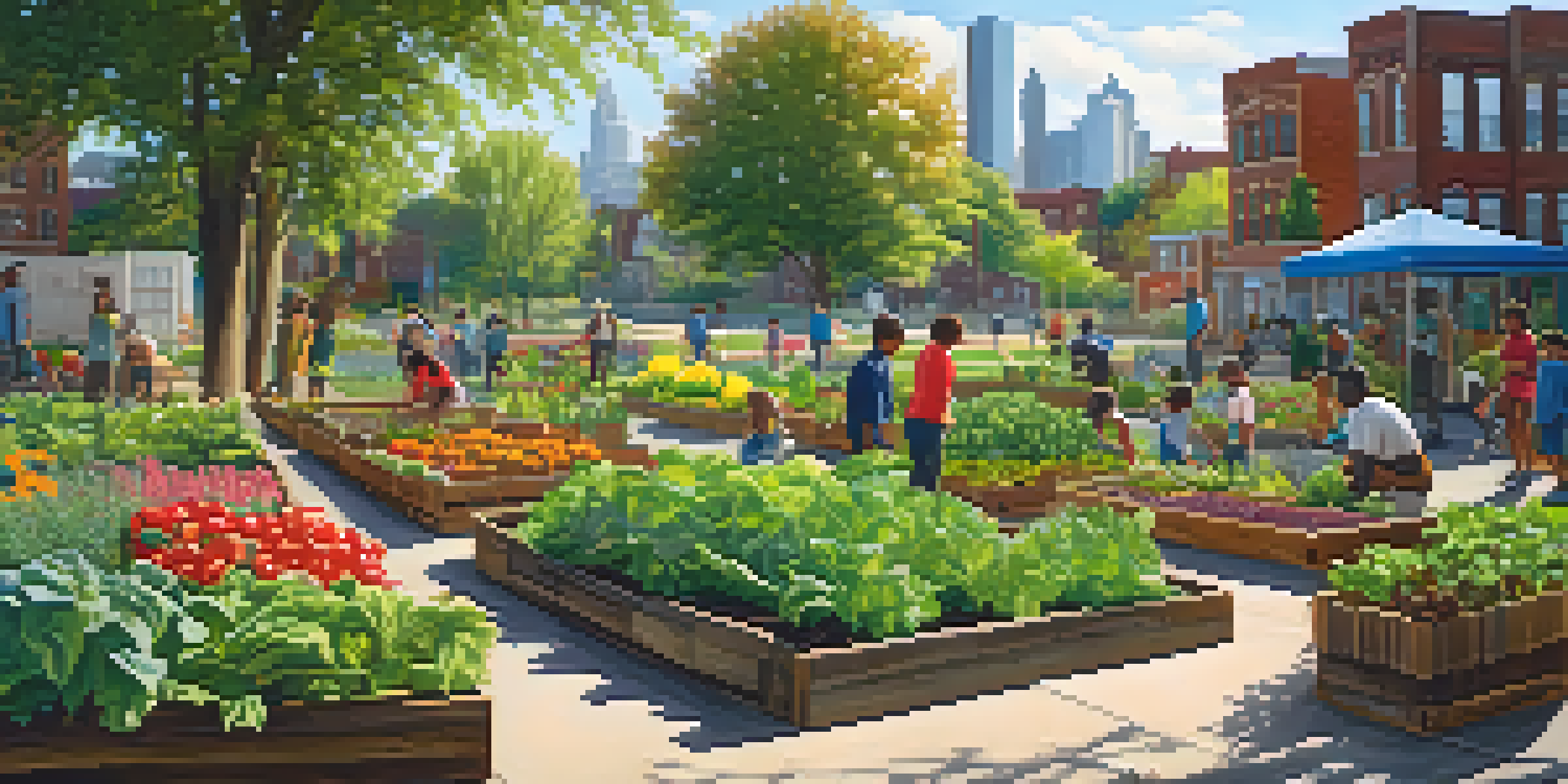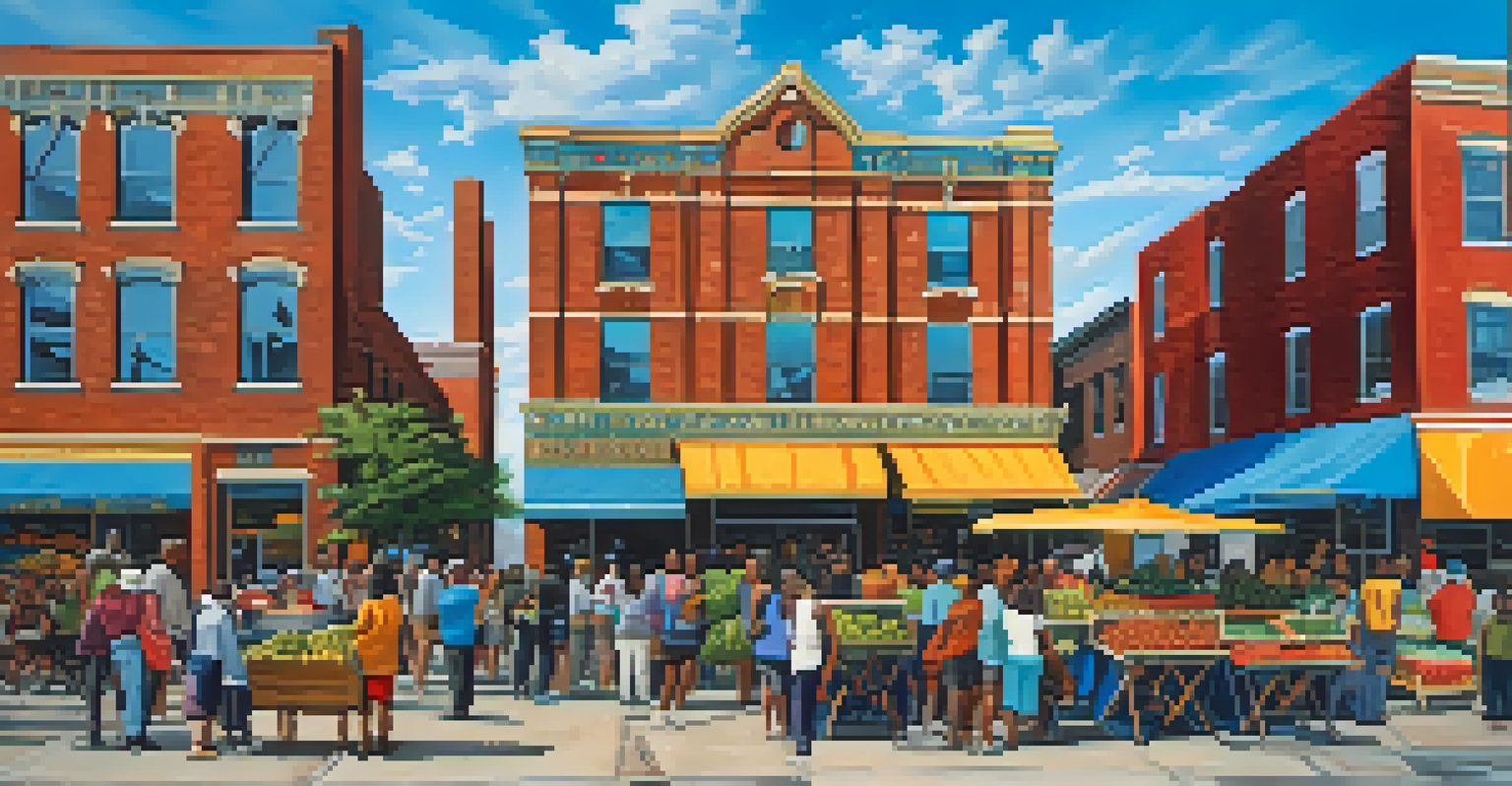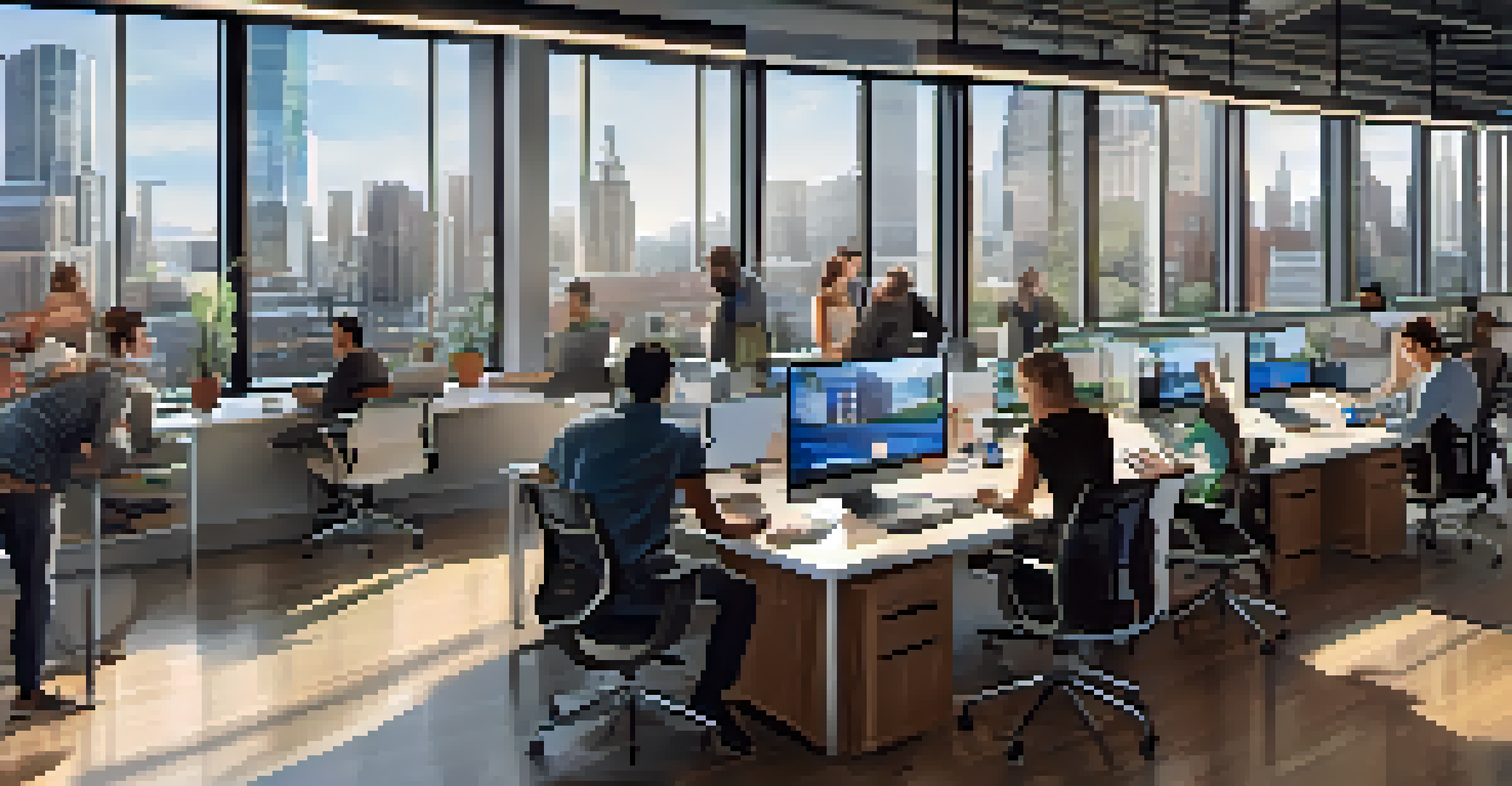Revitalizing Detroit: Economic Challenges and Community Efforts

A Brief History of Detroit's Economic Landscape
Detroit, once the booming heart of the American automotive industry, has faced significant economic challenges over the decades. The decline began in the late 20th century as automotive jobs dwindled, leading to widespread unemployment. This shift not only impacted the economy but also transformed the city's demographics, with many residents leaving in search of better opportunities.
The greatest danger in times of turbulence is not the turbulence; it is to act with yesterday's logic.
As industries moved away and manufacturing jobs became scarce, Detroit entered a period of decline that resulted in abandoned buildings and decreased property values. The city's population halved from its peak, creating a stark contrast between its prosperous past and its present state. This historical backdrop is essential to understanding the current revitalization efforts and community resilience.
Despite these challenges, the spirit of Detroit's residents has remained unbroken, fostering a sense of community and determination. Today, many are stepping up to reclaim their city, illustrating that even in the face of adversity, hope and collaboration can pave the way for revitalization.
Economic Challenges Facing Detroit Today
Detroit's economic struggles are multifaceted, encompassing high unemployment rates and limited access to quality education and healthcare. Many neighborhoods still grapple with poverty, making it difficult for families to thrive. Additionally, the city's aging infrastructure has hindered growth, creating further obstacles for businesses and residents alike.

The COVID-19 pandemic exacerbated these challenges, highlighting the vulnerabilities in various sectors, particularly hospitality and retail. Small businesses, which are vital to the local economy, faced closures, and many workers found themselves without jobs. This situation has led to an urgent need for innovative solutions to support recovery and reinvest in the community.
Revitalization Amid Economic Struggles
Despite facing significant economic challenges, Detroit residents are actively working to reclaim and revitalize their city through community initiatives.
Moreover, the economic inequality within the city has become more pronounced, with certain areas benefiting from investment while others remain neglected. Bridging this gap is crucial for creating a more equitable future for all Detroiters, ensuring that revitalization efforts are inclusive and comprehensive.
Community Initiatives Driving Change
In the face of these economic challenges, grassroots organizations and community members are stepping up to drive change. Initiatives focused on education, job training, and entrepreneurship are gaining momentum, empowering residents to take charge of their futures. For instance, programs that provide skills training in high-demand industries are helping individuals secure stable employment.
The only way to make sense out of change is to plunge into it, move with it, and join the dance.
Community gardens and local markets are also flourishing, promoting food security and fostering connections among residents. These efforts not only address immediate needs but also encourage a sense of belonging and collaboration. As neighbors come together to support one another, they are building a stronger foundation for the city's future.
The passion and commitment of Detroit's residents are evident in their efforts to revitalize their neighborhoods. From art installations to clean-up events, community-led initiatives are transforming vacant lots into vibrant spaces, breathing new life into the city. This grassroots movement demonstrates that change is possible when people unite for a common cause.
The Role of Local Government in Revitalization
Local government plays a crucial role in facilitating Detroit's revitalization efforts. By investing in infrastructure, public services, and community programs, officials can help create a more conducive environment for growth. Policies that support small businesses and attract new industries are essential to rebuilding the economy and providing job opportunities.
In recent years, the city has prioritized initiatives aimed at improving public safety, education, and transportation. These improvements are vital for attracting residents and businesses alike, fostering a sense of stability and confidence in the community. Collaboration between government entities and local organizations is key to ensuring that revitalization efforts are sustainable and effective.
Education Fuels Economic Recovery
Investing in education and vocational training is crucial for empowering Detroit's residents and creating a skilled workforce that attracts businesses.
Moreover, transparency and community engagement in decision-making processes are critical for rebuilding trust between residents and local leaders. When citizens feel heard and valued, they are more likely to participate actively in shaping the future of their city. This partnership can lead to innovative solutions that prioritize the needs of Detroit's diverse population.
The Importance of Education in Economic Recovery
Education is a cornerstone of economic recovery in Detroit, serving as a pathway to opportunity for many residents. Efforts to revamp the city's educational system have gained momentum, focusing on providing quality education and resources for students. By investing in schools and supporting teachers, the community can empower the next generation to thrive.
Programs that offer mentorship and tutoring services are helping students overcome obstacles and achieve their academic goals. Initiatives that connect education with real-world job opportunities, such as internships and apprenticeships, are essential for bridging the gap between schooling and the workforce. These efforts not only benefit individuals but also contribute to the overall economic health of the city.
Additionally, community colleges and vocational training programs are crucial for equipping adults with the skills needed in today's job market. By prioritizing education and lifelong learning, Detroit can create a more skilled workforce that attracts businesses and fosters economic growth. Investing in education is, therefore, an investment in the city's long-term success.
Harnessing Technology for Economic Growth
In today's digital age, technology is a vital driver of economic growth. Detroit is embracing innovation by fostering a tech-friendly environment that attracts startups and established companies alike. This shift can create job opportunities, stimulate entrepreneurship, and ultimately contribute to the city's revitalization.
Local initiatives aimed at promoting tech education and training are essential for ensuring that residents can participate in this growing sector. By providing access to resources and mentorship, aspiring entrepreneurs and tech enthusiasts can turn their ideas into reality. This emphasis on technology also helps diversify the economy, reducing reliance on traditional industries.
Sustainability in Urban Development
Emphasizing sustainability in revitalization efforts can lead to an environmentally friendly economy while improving the quality of life for Detroit residents.
Moreover, the integration of technology in various sectors, such as healthcare and manufacturing, can enhance efficiency and productivity. As Detroit positions itself as a hub for innovation, it can leverage its rich history of industrial prowess while embracing the future. This balance can spark a new era of growth and opportunity for the city.
Building a Sustainable Future for Detroit
Sustainability is a key focus in Detroit's revitalization efforts, ensuring that growth is both environmentally friendly and economically viable. Community-led initiatives that promote green spaces, renewable energy, and sustainable practices are gaining traction. These efforts not only enhance the quality of life for residents but also attract environmentally-conscious businesses and investors.
Urban farming and green infrastructure projects are examples of how residents are taking charge of their environment. By transforming vacant lots into community gardens or parks, Detroiters are fostering a sense of ownership and stewardship. Such projects not only improve aesthetics but also promote biodiversity and community well-being.

As the city moves forward, embracing sustainability can lead to a more resilient economy. By prioritizing eco-friendly practices and technologies, Detroit can create jobs while addressing pressing environmental challenges. This holistic approach to revitalization can set a positive example for other cities facing similar economic hurdles.